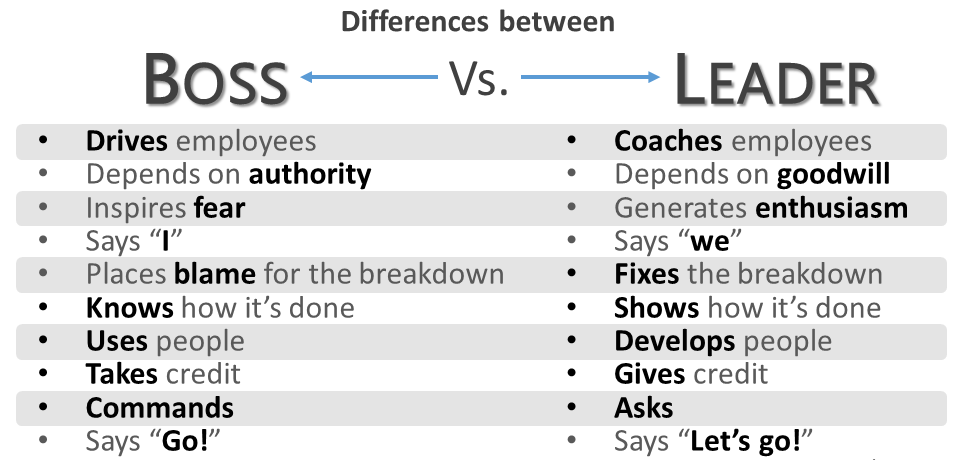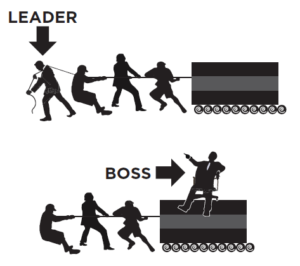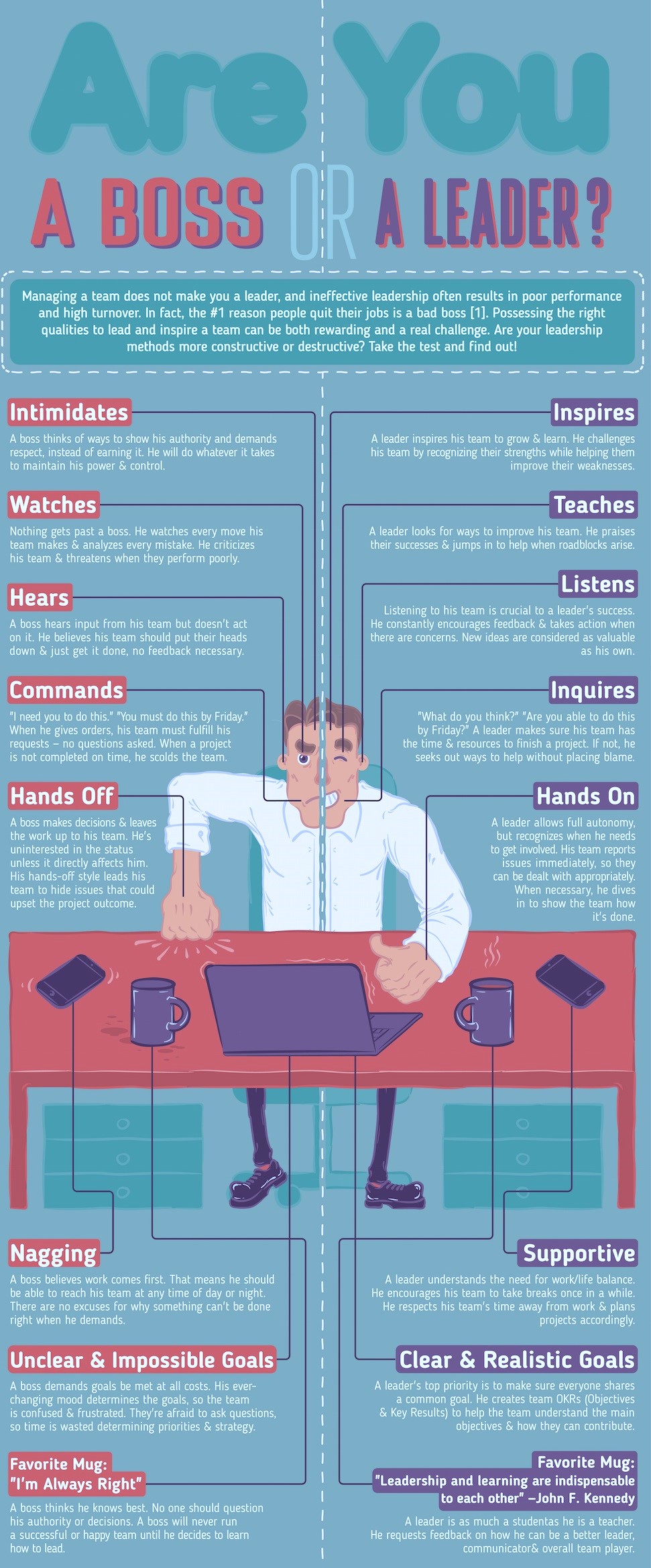Boss vs. Leader – How to Be a Better Leader and Not Just a Boss
While a leader can be a boss, not every boss is a leader.
Although leaders and bosses have nearly identical definitions, in effect, they are different in today’s competitive world.
Just the term “leader” evokes more positivity than that of “boss.” However, when people dream of getting to higher positions in life, business or politics, they unfortunately often think more about being bosses than leaders. Following table shows some most important differences how to distinguish a leader from a boss:

A possible explanation for this is that being a leader requires much more responsibility, effort and human knowledge in a job than being just a boss. Seeing often that being the boss doesn’t require going above and beyond to impress a superior.
While a boss is mostly concerned with outcomes, a leader feels responsible for the process of that outcome and the people who see it out.

Has a Vision and a Mission
A boss may tell their team what they are going to do, but a leader paints a vision that is larger than any single person. This vision may generate enthusiasm and inspires the team to work together to achieve a goal that perhaps no one could do on their own. On the other side boss mostly tries to use fear as a motivational leverage.
The “how to be a better leader” test: Ask five employees what the vision and mission of your company is. If you receive blank stares or five different answers, you may be a boss. To be a better leader, it may be worthwhile to home in on your company’s vision and mission, and begin creating a company culture that reflects those values.
Shares Information and Resources
A boss may keep strict control over the flow of information and all of the company’s resources; it may be a one-way form of communication from them to the employees. A leader openly shares information and their knowledge; they usually encourage ideas and discussions. A leader may count on their management team to take this information to the larger team so it can become action.
The “how to be a better leader” test: How many people on your team know what the company’s secret sauce is and contributes to the recipe? If you are the only one, you may be a boss. Becoming a better leader may be possible by empowering your team. Consider sharing information that may help them contribute to the business’ growth.
Encourages Employees to Help with Decision Making
Bosses may consider themselves to be an “expert in everything” and may think of themselves as the only person able to deliver a solution to the entire team. A leader may facilitate brainstorming and encourage their team to ask smart questions. They may be more inclined than a boss to make a decision based on discussions they’ve had with their team. A leader may say what they think needs to be done, but the team members may help decide how it’s actually executed.
Practices Clear Ethics
Bosses may be able to regularly justify their means by the end results. If they fail, they may find a scapegoat. A leader may be more transparent and may be more willing to accept the blame if their company fails.
The “how to be a better leader” test: Think of the last thing that went wrong in your company. Who did you blame? If you blamed an employee without looking into how you may have played a role in that failure, you may be a boss.
Respects Everyone’s Time
A boss may think that their time is more valuable than their team’s, which may result in them tending to be long winded, scheduling endless meetings and requiring tedious follow up. A leader usually recognizes that everyone’s time is valuable, and may try to make sure that no one has to wait unnecessarily for them or for valuable information. They may be good at setting priorities so their team can be the most productive they can be. Leaders may also realize that their team members have a life and don’t expect them to work 24/7.
The “how to be a better leader” test: Do you value your time over your teams? If you answered “yes,” you may want to perhaps rethink your office meetings to focus on priorities and not minutiae.
Is Generous With Praise
Bosses may expect big results because they pay employees. They also tend to take credits for all the work done by employees, while leaders give credit to employees, offer immediate praise, thanks and constructive criticism (when appropriate) as it happens. They may realize that team members are rewarded by other incentives in addition to money. Leaders may make time to pause and celebrate employees’ wins individually or as a company.
The “how to be a better leader” test: When was the last time you praised an employee? If it wasn’t this week, you may be a boss. Taking time to praise an employee for a job well-done may help you become a better leader.
Creates More Leaders
A boss may tend to think that there can only be one boss, and that they need to be at the center of everything. A leader may thrive by creating more leaders inside the company to perhaps replace them one day.
The “how to be a better leader” test: Who was the last leader you created at your company? If you can’t think of anyone, it may be time to consider tapping a capable and trustworthy employee to start taking on more of your workload—of course, with a commensurate increase in benefits.
Remember this adage:
“Bosses have jobs and leaders build companies. To create an effective team, owners may want to think more about how they can become better leaders and/or choose and appoint good leaders.”
Graphical overview of main differences between being just a boss or also a leader

I WISH MORE INFO ABOUT COACHING TO BECOME A BETTER LEADER








